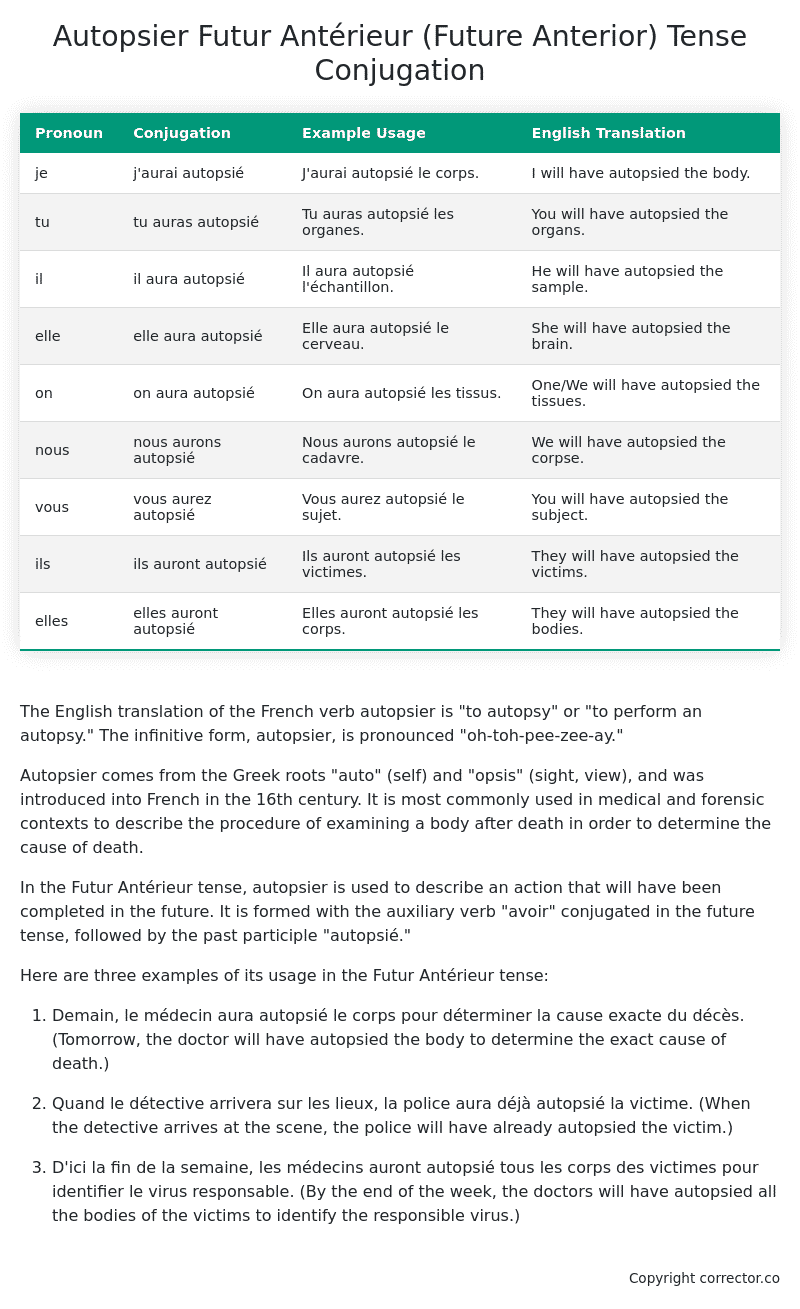Futur Antérieur (Future Anterior) Tense Conjugation of the French Verb autopsier
Introduction to the verb autopsier
The English translation of the French verb autopsier is “to autopsy” or “to perform an autopsy.” The infinitive form, autopsier, is pronounced “oh-toh-pee-zee-ay.”
Autopsier comes from the Greek roots “auto” (self) and “opsis” (sight, view), and was introduced into French in the 16th century. It is most commonly used in medical and forensic contexts to describe the procedure of examining a body after death in order to determine the cause of death.
In the Futur Antérieur tense, autopsier is used to describe an action that will have been completed in the future. It is formed with the auxiliary verb “avoir” conjugated in the future tense, followed by the past participle “autopsié.”
Here are three examples of its usage in the Futur Antérieur tense:
-
Demain, le médecin aura autopsié le corps pour déterminer la cause exacte du décès. (Tomorrow, the doctor will have autopsied the body to determine the exact cause of death.)
-
Quand le détective arrivera sur les lieux, la police aura déjà autopsié la victime. (When the detective arrives at the scene, the police will have already autopsied the victim.)
-
D’ici la fin de la semaine, les médecins auront autopsié tous les corps des victimes pour identifier le virus responsable. (By the end of the week, the doctors will have autopsied all the bodies of the victims to identify the responsible virus.)
Table of the Futur Antérieur (Future Anterior) Tense Conjugation of autopsier
| Pronoun | Conjugation | Example Usage | English Translation |
|---|---|---|---|
| je | j’aurai autopsié | J’aurai autopsié le corps. | I will have autopsied the body. |
| tu | tu auras autopsié | Tu auras autopsié les organes. | You will have autopsied the organs. |
| il | il aura autopsié | Il aura autopsié l’échantillon. | He will have autopsied the sample. |
| elle | elle aura autopsié | Elle aura autopsié le cerveau. | She will have autopsied the brain. |
| on | on aura autopsié | On aura autopsié les tissus. | One/We will have autopsied the tissues. |
| nous | nous aurons autopsié | Nous aurons autopsié le cadavre. | We will have autopsied the corpse. |
| vous | vous aurez autopsié | Vous aurez autopsié le sujet. | You will have autopsied the subject. |
| ils | ils auront autopsié | Ils auront autopsié les victimes. | They will have autopsied the victims. |
| elles | elles auront autopsié | Elles auront autopsié les corps. | They will have autopsied the bodies. |
Other Conjugations for Autopsier.
Le Present (Present Tense) Conjugation of the French Verb autopsier
Imparfait (Imperfect) Tense Conjugation of the French Verb autopsier
Passé Simple (Simple Past) Tense Conjugation of the French Verb autopsier
Passé Composé (Present Perfect) Tense Conjugation of the French Verb autopsier
Futur Simple (Simple Future) Tense Conjugation of the French Verb autopsier
Futur Proche (Near Future) Tense Conjugation of the French Verb autopsier
Plus-que-parfait (Pluperfect) Tense Conjugation of the French Verb autopsier
Passé Antérieur (Past Anterior) Tense Conjugation of the French Verb autopsier
Futur Antérieur (Future Anterior) Tense Conjugation of the French Verb autopsier (this article)
Subjonctif Présent (Subjunctive Present) Tense Conjugation of the French Verb autopsier
Subjonctif Passé (Subjunctive Past) Tense Conjugation of the French Verb autopsier
Subjonctif Imparfait (Subjunctive Imperfect) Tense Conjugation of the French Verb autopsier
Subjonctif Plus-que-parfait (Subjunctive Pluperfect) Tense Conjugation of the French Verb autopsier
Conditionnel Présent (Conditional Present) Tense Conjugation of the French Verb autopsier
Conditionnel Passé (Conditional Past) Tense Conjugation of the French Verb autopsier
L’impératif Présent (Imperative Present) Tense Conjugation of the French Verb autopsier
L’infinitif Présent (Infinitive Present) Tense Conjugation of the French Verb autopsier
Struggling with French verbs or the language in general? Why not use our free French Grammar Checker – no registration required!
Get a FREE Download Study Sheet of this Conjugation 🔥
Simply right click the image below, click “save image” and get your free reference for the autopsier Futur Antérieur tense conjugation!

Autopsier – About the French Futur Antérieur (Future Anterior) Tense
Construction
Common Everyday Usage Patterns
Interactions with Other Tenses
For example
Summary
I hope you enjoyed this article on the verb autopsier. Still in a learning mood? Check out another TOTALLY random French verb conjugation!


